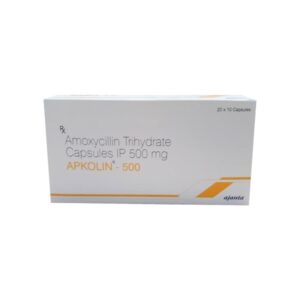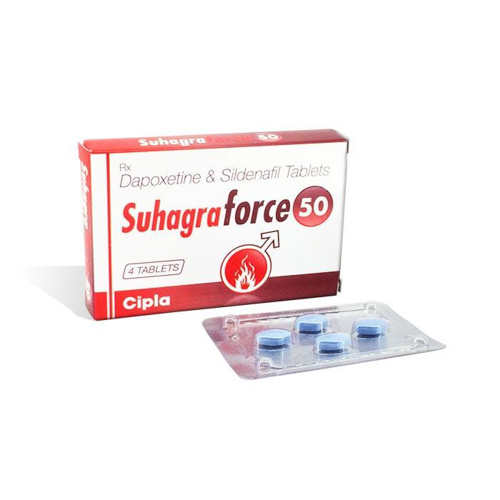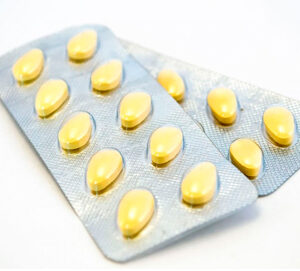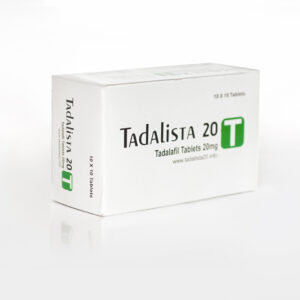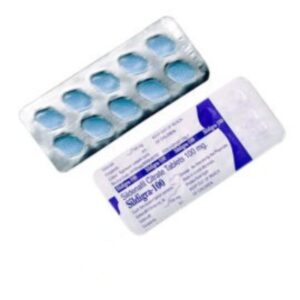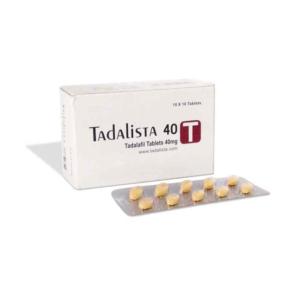Suhagra Force 50 (Viagra with Dapoxetine) 50/30 Mg – 4 tablet
Each Suhagra contains 50 mg Sildenafil with 30 mg Dapoxetine 4 tablets, Used to treat erectile dysfunction in males and maintain a firmer harder erection.
ATC Classification: G04BE03
Active Ingrediant: Sildenafil/Dapoxetine
Generic Name: Suhagra Force 50
Manufacturer: Cipla Limited
Strength: 50/30 Mg
Dosage Type: Tablet
Packaging Type: Foil in Box
Contains: 4 Tab
What is this drug used for?
• It is used to treat erectile dysfunction (ED).
• It is used to treat high blood pressure in the lungs.
• It may be given to you for other reasons. Talk with the doctor.
Frequently reported side effects of this drug
• Diarrhea
• Flushing
• Redness
• Heartburn
• Muscle pain
• Nosebleed
• Stuffy nose
• Runny nose
• Back pain
• Trouble sleeping
Other side effects of this drug: Talk with your doctor right away if you have any of these signs of:
• Severe cerebrovascular disease like change in strength on one side is greater than the other, difficulty speaking or thinking, change in balance, or vision changes.
• Chest pain
• Fast heartbeat
• Abnormal heartbeat
• Dizziness
• Passing out
• Severe headache
• Severe nausea
• Vomiting
• Vision changes
• Blindness
• Trouble hearing
• Noise or ringing in the ears
• Difficulty breathing
• Swelling of arms or legs
• Bleeding
• Bruising
• Erection that lasts more than 4 hours
• Signs of a significant reaction like wheezing; chest tightness; fever; itching; bad cough; blue skin color; seizures; or swelling of face, lips, tongue, or throat.
Note: This is not a comprehensive list of all side effects. Talk to your doctor if you have questions.
Pronunciation
(sil DEN a fil)
Medication Safety Issues
Sound-alike/look-alike issues:
Revatio may be confused with ReVia, Revonto
Sildenafil may be confused with silodosin, tadalafil, vardenafil
Viagra may be confused with Allegra, Vaniqa
Storage and Stability
Tablets/injection: Store at 20°C to 25°C (68°F to 77°F); excursions are permitted to 15°C to 30°C (59°F to 86°F).
Oral suspension: Store unreconstituted powder below 30°C (86°F); protect from moisture. Store reconstituted oral suspension below 30°C (86°F) or at 2°C to 8°C (36°F to 46°F). Do not freeze. Discard unused Revatio oral suspension after 60 days.
Adverse Reactions
Based upon normal doses for either indication or route. (Adverse effects such as flushing, diarrhea, myalgia, and visual disturbances may be increased with adult doses >100 mg/24 hours.)
Cardiovascular: Flushing
Central nervous system: Dizziness, headache, insomnia, paresthesia
Dermatologic: Erythema, skin rash
Gastrointestinal: Diarrhea, dyspepsia, gastritis, nausea
Genitourinary: Urinary tract infection
Hepatic: Increased liver enzymes
Neuromuscular & skeletal: Back pain, myalgia
Ophthalmic: Visual disturbance (including vision color changes, blurred vision, and photophobia)
Respiratory: Epistaxis, exacerbation of dyspnea, nasal congestion, rhinitis, sinusitis
Miscellaneous: Fever
Rare but important or life-threatening: Abnormal hepatic function tests, absent reflexes, amnesia (transient global), anemia, anorgasmia, anterior chamber eye hemorrhage, anterior ischemic optic neuropathy, arthritis, auditory impairment, basal cell carcinoma (Loeb 2015), breast hypertrophy, burning sensation of eyes, cardiac failure, cataract, cerebrovascular hemorrhage, colitis, cystitis, depression, diaphoresis, diplopia, dry eye syndrome, dysphagia, ECG abnormality, ejaculatory disorder, exfoliative dermatitis, falling, gastroenteritis, genital edema, gingivitis, glossitis, gout, herpes simplex infection, hyperglycemia, hypernatremia, hypersensitivity reaction, hypertension, hypertonia, hypoglycemia, increased bronchial secretions, increased intraocular pressure, ischemic heart disease, laryngitis, leukopenia, malignant melanoma (Li 2014; Loeb 2015), migraine, myasthenia, mydriasis, myocardial infarction, neuralgia, neuropathy, orthostatic hypotension, otalgia, peripheral edema, pharyngitis, photophobia, priapism, prolonged erection, pulmonary hemorrhage, rectal hemorrhage, retinal edema, retinal hemorrhage, retinal vascular disease, rupture of tendon, seizure, severe sickle cell crisis (vaso-occlusive crisis in patients with pulmonary hypertension associated with sickle cell disease), skin photosensitivity, stomatitis, syncope, synovitis, tachycardia, transient ischemic attacks, unstable diabetes, urinary incontinence, ventricular arrhythmia, vitreous detachment, vitreous traction

